From 69 hours of King James Bible reading over Easter Week to this racy evening of adapted medieval pith as we head towards Assumption Day, the word they tell us is God moves in fluid if not necessarily mysterious ways around the Globe. “Mysteries” refers to the guilds that put on these popular street shows in the Middle Ages, real enough for the company of York Pinners, say, to supervise the nailing to the cross. It needs the forthright actors and everyday props of Deborah Bruce's alternately funny and quietly moving production, as well as the blood and sawdust you can taste in Tony Harrison’s latest performing version.
His first was for the epoch-making walkabout event at the National Theatre’s Cottesloe back in 1985 (to find out exactly how they differ I need to get hold of the Faber text, since no one’s telling at the moment). Was the experience stronger then, or was it simply that we’d not seen anything quite like it at the time? Certainly the Globe ensemble of 14 actors - many from this season's production of Much Ado About Nothing - playing 56 parts has fewer charismatic figures: remember Brian Glover’s Northern God? But once David Hargreaves’s Nobodaddy - not quite the ancient of days so controversially depicted by Philip Pullman in The Amber Spyglass but a gruff codger you imagine wants to get back to his pipe and slippers and watch Midsomer Murders – has despatched Lucifer (Paul Hunter, who knows how to work a crowd), individual charisma is hardly needed until the advent of the Son of Man.
 The Old Testament scenes are told in concise snippets no longer than your average pop video, but without any of the special effects, and none the worse for that. The creation of the world comes from packing cases, along with Adam and a quickly seduced Eve (Marcus Griffiths and Lisa McGrillis, pictured right); Noah’s garden-shed ark crests a blue bolt of seacloth in a flood that’s over in a minute; and Cain, clad like Abel in sacking which looks as if it’s from the nearby Borough Market, says he’s going back to Gateshead having scythed his sibling (watch out, the text's alliteration is catching). Just in case you’re expecting a whistlestop tour of the entire Old Testament, our medieval storytellers stop at Abraham and Isaac, because God tells his agonisedly faithful prophet – a plausibly anguished Joe Caffrey, tellingly transfigured from the brother-slayer - he'll be sacrificing his own son; cue Mary, Joseph, cherry tree and Gabriel. We meet William Ash’s Jesus-via-Isaac at the River Jordan – the Noah’s-flood cloth again – where supermarket-trolley-pushing tramp John the Baptist (big, bearded John Stahl) is pressed into service by the ubiquitous Gabriel (Philip Cumbus): a lovely scene this, that like so many gets to the essence of the tale-telling.
The Old Testament scenes are told in concise snippets no longer than your average pop video, but without any of the special effects, and none the worse for that. The creation of the world comes from packing cases, along with Adam and a quickly seduced Eve (Marcus Griffiths and Lisa McGrillis, pictured right); Noah’s garden-shed ark crests a blue bolt of seacloth in a flood that’s over in a minute; and Cain, clad like Abel in sacking which looks as if it’s from the nearby Borough Market, says he’s going back to Gateshead having scythed his sibling (watch out, the text's alliteration is catching). Just in case you’re expecting a whistlestop tour of the entire Old Testament, our medieval storytellers stop at Abraham and Isaac, because God tells his agonisedly faithful prophet – a plausibly anguished Joe Caffrey, tellingly transfigured from the brother-slayer - he'll be sacrificing his own son; cue Mary, Joseph, cherry tree and Gabriel. We meet William Ash’s Jesus-via-Isaac at the River Jordan – the Noah’s-flood cloth again – where supermarket-trolley-pushing tramp John the Baptist (big, bearded John Stahl) is pressed into service by the ubiquitous Gabriel (Philip Cumbus): a lovely scene this, that like so many gets to the essence of the tale-telling.
 There are more vivid tableaux in the second half. Christ stretches himself out meekly on a cross construction, only to meet with casual, pragmatic violence from fluorescent-jacketed, hard-hatted builders who wince in sharp bursts of comedy at jippy-back heaving or accidental self-hammering. And the Wooden O comes into its own with a space for Golgotha cordoned off at the front of the arena and Gabriel as Globe steward commandeering an arbitrary halfway division of Saved and Damned – groundlings and privileged seated folk alike – to whom Jesus delivers his "when I needed a neighbour, were you there?" spiel.
There are more vivid tableaux in the second half. Christ stretches himself out meekly on a cross construction, only to meet with casual, pragmatic violence from fluorescent-jacketed, hard-hatted builders who wince in sharp bursts of comedy at jippy-back heaving or accidental self-hammering. And the Wooden O comes into its own with a space for Golgotha cordoned off at the front of the arena and Gabriel as Globe steward commandeering an arbitrary halfway division of Saved and Damned – groundlings and privileged seated folk alike – to whom Jesus delivers his "when I needed a neighbour, were you there?" spiel.
There's the occasional quiet monologue which is subtly moving: what could go more directly to the heart than senior Mary’s wondering lines on the Ascension, with the simple refrain, "A cloud has born my bairn to bliss", as delivered by Helen Weir, or her quiet death in a wheelchair? I’d have liked the other actors in moments like these to really inhabit their space and trust the audience more, and several versions of Northern dialect aren’t always clear; they need to be more so in the harrowing of hell, a sequence which won’t be familiar to all spectators, but then that’s one of several mystery-play interpolations which may pleasantly surprise lovers of the KJB (and signals the surprise returns of Lucifer, Adam and Eve). Olly Fox's score is good for selective scene painting - I loved the musical saw for the risen Christ - though less striking in the songs (the "4,600 years" number for the Old Testament folk in hell feels as long as its subject). But what you’ll take away are many strong impressions beautifully etched by the hempen-homespun look of the production and Harrison’s earthy poetry.
- The Globe Mysteries in repertory at Shakespeare's Globe until 1 October

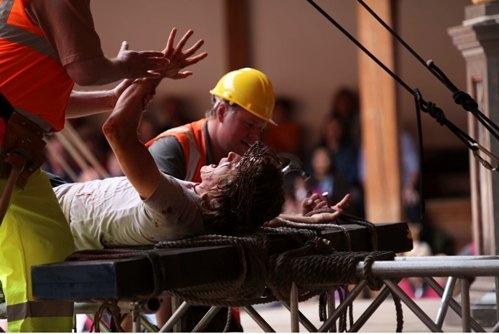

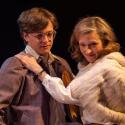
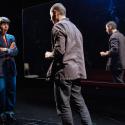

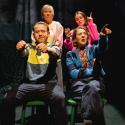


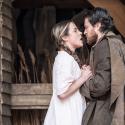


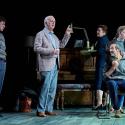
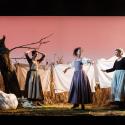
Add comment